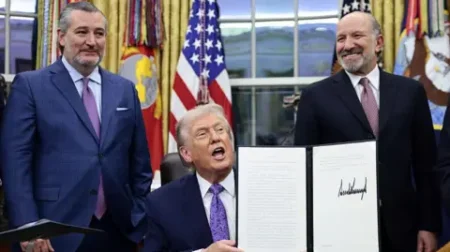The recent feud between Elon Musk, the CEO of Tesla, and former U.S. President Donald Trump has resulted in a significant drop in Tesla’s stock value, a scenario that highlights the profound impact that political relationships can have on corporate sectors. Following a series of escalating tensions, shares in Tesla plummeted by 14%, erasing approximately $150 billion in market capitalization—a striking loss that positions itself as one of the most turbulent days for the electric vehicle manufacturer in recent times.
The root of this discord stems from Musk’s criticism of a Trump-backed spending bill, which he argues would exacerbate the national debt. In response to Musk’s criticisms, Trump threatened to revoke government contracts held by Musk’s companies, notably SpaceX, which is known for its substantial contracts with governmental entities worth tens of billions of dollars. This opportunistic maneuver by the former president underscores the leverage that political affiliations and public perceptions can exert over a business’s financial health.
As the public feud intensified, Musk’s retort to Trump’s threats came swiftly: “Go ahead, make my day.” The social media exchanges reflected an increasingly personal and contentious nature, escalating beyond ideological differences. The fray swiftly drew the attention of investors, many of whom expressed their disbelief and frustration as they monitored the impact on Tesla’s stock. Dan Ives, an analyst with Wedbush Securities, commented on the shocking nature of this development, indicating that investors are now wrestling with concerns regarding potential regulatory changes driven by this fallout.
Investors had previously been buoyed by the prospects of a favorable relationship between Musk and Trump, which many anticipated would yield benefits for Tesla, such as reduced regulations on self-driving technology and innovation within the electric vehicle industry. However, recent events have muddied this optimism, particularly as Musk’s political ties began to damage his reputation and the sales performance of Tesla, particularly in European markets. Reports of Musk seeking to secure an extravagant compensation package also raised eyebrows and fueled concerns regarding his focus on Tesla amidst ongoing political battles.
The underlying issues intensified further with Musk’s dissent regarding Trump’s tariffs, which he has warned could lead to economic downturns. Furthermore, Trump remarked that Musk’s political welcome at the White House was growing tenuous, attributing it to Musk’s disappointment over the removal of a tax credit that had significantly benefitted Tesla’s sales. This tax credit was crucial for the electric vehicle market’s expansion in the United States.
As investors reevaluate Musk’s priorities and the implications of his political activism, the current landscape appears challenging for Tesla. The turmoil coincides with a time when Musk had previously indicated plans to step back from his government role—a move that had helped temporarily stabilize investor sentiment. However, with tensions flaring anew, the risk of enduring political instability surrounding Tesla’s leadership becomes a pressing concern.
In conclusion, this escalating feud raises pertinent questions about the intersection of politics and corporate governance. Experts and investors alike are now left pondering the long-term effects that these disputes might have on company valuations and investor confidence, with the view that a resolution must be sought to alleviate anxieties and restore stability within the market. The unfolding saga is not just a clash of personalities; it embodies the influence of political alliances on major corporate players in today’s economy. As the dialogue continues, the hope for productive relationships remains vital for Tahle investors, who eagerly await developments that could indicate a turn in Tesla’s fortunes amidst growing uncertainties.











